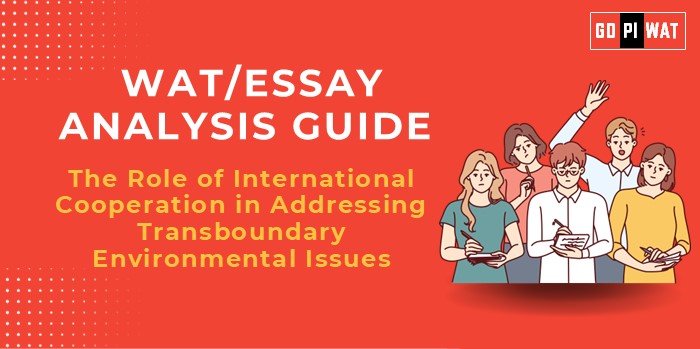📋 Written Ability Test (WAT)/Essay Analysis Guide: The Role of International Cooperation in Addressing Transboundary Environmental Issues
🌐 Understanding the Topic’s Importance
This essay reflects the growing need for collaborative solutions in an interconnected world, particularly relevant for B-school aspirants focusing on global business and sustainability strategies. International cooperation plays a pivotal role in addressing challenges that transcend borders, from climate change to ocean pollution.
🕒 Effective Planning and Writing
⏱️ Time Allocation:
- 📅 Planning: 5 minutes
- ✍️ Writing: 20 minutes
- 🔍 Review: 5 minutes
📖 Preparation Tips:
Research examples of successful and failed international treaties, such as the Montreal Protocol and Paris Agreement, and identify key stakeholders like governments, corporations, and NGOs.
✨ Introduction Techniques for Essays
🔄 Contrast Approach:
“While countries independently combat pollution, the collective failure to address cross-border issues, like ocean plastic, showcases the urgent need for global cooperation.”
💡 Solution-Based Approach:
“A unified global approach to environmental challenges, like the Paris Agreement, is essential for addressing interconnected issues like climate change and biodiversity loss.”
📋 Structuring the Essay Body
🏆 Paragraph 1: Achievements
Highlight key successes:
- 🌏 Montreal Protocol: Successfully phased out 99% of ozone-depleting substances, proving the efficacy of global cooperation.
- 🔋 Renewable Energy Growth: International collaborations have driven an 8% rise in global renewable energy use in 2022.
⚠️ Paragraph 2: Challenges with Comparative Analysis
Discuss disparities and enforcement issues:
- 🌳 Amazon Basin: Deforestation impacts multiple countries but lacks cohesive policies for preservation.
- ❄️ Arctic Ice Cap Policies: Conflicts between nations over resource exploitation hinder conservation efforts.
🌟 Paragraph 3: Future Outlook
Suggest roles for technology and partnerships:
- 🤝 Public-Private Partnerships: Combine resources and expertise to scale sustainable initiatives.
- 💻 Emerging Technologies: AI and satellite monitoring for compliance and resource tracking.
📄 Concluding Effectively
⚖️ Balanced Conclusion:
“International cooperation has demonstrated potential in environmental management, but addressing enforcement and equity issues is crucial for sustainable progress.”
🌍 Global Comparison Conclusion:
“As countries like Norway lead in renewable energy and reforestation, others must follow suit to ensure collective success.”
📊 Analyzing Successes and Shortcomings
✨ Achievements:
- 🔋 Renewable energy growth driven by treaties and global investments.
- 🌏 Treaty successes like the Montreal Protocol showcasing effective multilateral actions.
⚠️ Challenges:
- ⚖️ Unequal participation due to resource gaps in developing nations.
- 🔍 Weak enforcement mechanisms undermining treaty effectiveness.
🌍 Global Context:
- 🇪🇺 The EU’s cohesive environmental policies contrast with fragmented approaches in some developing nations.
- 🇧🇷 Brazil’s reforestation successes highlight the importance of targeted policies and international support.
💡 Recommendations for Sustainable Progress
- ⚖️ Strengthen Enforcement Mechanisms: Introduce punitive measures for non-compliance.
- 💰 Increase Funding for Developing Countries: Ensure equitable participation through financial aid.
- 💻 Leverage AI and Technology: Use advanced tools for better monitoring and compliance tracking.
✍️ Sample Short Essays
⚖️ Balanced Perspective:
“International environmental efforts like the Paris Agreement underscore the potential of collaboration, but unequal participation often hampers progress. By addressing these gaps, the world can better combat climate challenges.”
🌟 Solution-Oriented:
“Strengthened funding mechanisms for developing nations and technology-driven enforcement can elevate global treaties to deliver impactful results on transboundary issues.”
🌍 Global Comparison:
“While countries like Germany excel in renewable energy policies, global progress requires every nation to adopt similarly ambitious frameworks.”


